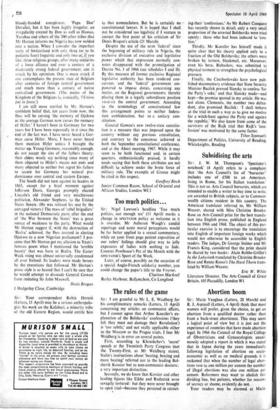The rules of the game
Sir : I am grateful to Mr L. E. Weidberg for his complimentary remarks (Letters, 11 April) concerning my articles on communist affairs, but I cannot agree that Arthur Koestler's ex- planation of the Bolsheviks' confessions ('they felt they must not damage their Revolution') is 'too subtle,' and not really applicable either to the Moscow or the Prague trials. I fear Mr Weidberg is in error on several points.
First, according to Khrushchev's 'secret' speech at the Twentieth Party Congress (not the Twenty-First, as Mr Weidberg states), Stalin's instructions about 'beating, beating and more beating' referred not to the leading Bol- shevik Kossior but to non-communist doctors: a very important distinction.
Secondly, we do know that Kossior and other leading figures like Eikhe and Rudzutak were savagely tortured: but they were never brought to open trial—because they persisted in retract- ing. their 'confessions.' As Mr Robert Conquest has recently shown in detail, only a very small proportion of the arrested Bolsheviks were tried openly : those who had been induced to 'con- fess.'
Thirdly, Mr Koestler has himself made it quite clear that his theory applied only to a fraction of the Old Bolsheviks; the others were broken by torture, blackmail, etc. Moreover, even his hero, Rubashov, was submitted to physical torment to strengthen the psychological pressure.
Finally, the Czechoslovaks have now pub- lished documentary evidence that State Security Minister Bacilek pressed Slansky to confess 'for the Party's sake,' and that Slansky made—and kept—the promise quoted in my article. He was not alone. Clementis, the number two defen- dant, also promised Bacilek : 'I shall behave at the trial in such a way as to give no motive for a witch-hunt against the Party and against the republic.' We also know from some of the survivors of the Rajk trial that Rajk's 'con- fession' was motivated by the same factor.
Tibor Szamuely Department of Politics, University of Reading, Whiteknights, Reading










































 Previous page
Previous page